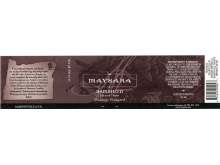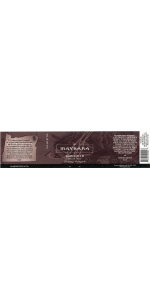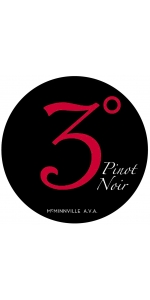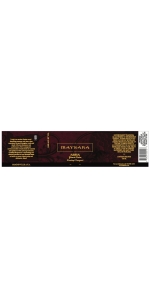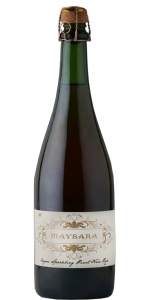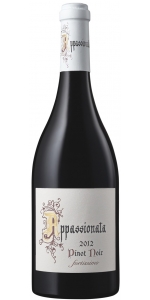Maysara Jamsheed Pinot Noir 2012
| Country: | United States |
| Regions: | Oregon Oregon (Willamette) |
| Winery: | Maysara Winery |
| Grape Type: | Pinot Noir |
| Organic: | Yes |
| Vintage: | 2012 |
| Bottle Size: | 750 ml |
Maysara Jamsheed Pinot Noir is made of 100 percent Pinot Noir
11 months in 10% new French oak barrels
According to ancient Persian legend, King Jamsheed was able to observe his entire realm by peering into his full wine goblet.
Beginning with a generous core of red-black fruits, the McMinnville AVA saunters over the palate with both bravado and grace. Blackberry and fresh cracked pepper entwine perfectly with matured and lengthy tannins on the finish. The depth of this unassuming bottling is always an adventure to mine. Some older prospectors hear tell of herbal notes… silver sage? rosemary?
At Maysara Winery & Momtazi Vineyard, we are committed to cap-turing the complete expression of our land and conveying it to you through superior quality in every bottle. We practice only low-impact, holistic farming methods in our Demeter Certified Biodynamic Vineyard. We are confident these practices are the best way to capture the true essence of the soil in our fruit and ensure health of our vines and the unique accent of our terroir for generations. This philosophy is carried into the cellar, where Demeter Certified Biodynamic wine-making practices produce wines with intensity, sophistication and elegance while maintaining a purity of both fruit and earth.
Always offering generous accessibility, pair Jamsheed with darker fowl, grilled meats or salmon, even caramelized veggies.
Maysara 3 Degrees Pinot Noir is 100 percent Pinot Noir
Aged 11 months in neutral French oak barrels
3° (Three Degrees) Pinot Noir is handcrafted by the Momtazi sisters whose differing personalities; combined with elegance, finesse and balance, reflect the dynamic characteristics of the Momtazi Vineyard. The sisters, Tahmiene, Naseem and Hanna, set out to make a pinot that tastes great and has the highest quality fruit all while being affordable for everyone.
Intriguing notes of fresh earth, oak leaves and pepper are woven together in the initial impression. Lifted, verdant tannins give this wine a firm structure for the vintage to showcase its characteristic starry-eyed smile.
At Maysara Winery & Momtazi Vineyard, we are committed to cap-turing the complete expression of our land and conveying it to you through superior quality in every bottle. We practice only low-impact, holistic farming methods in our Demeter Certified Biodynamic Vineyard. We are confident these practices are the best way to capture the true essence of the soil in our fruit and ensure health of our vines and the unique accent of our terroir for generations. This philosophy is carried into the cellar, where Demeter Certified Biodynamic wine-making practices produce wines with intensity, sophistication and elegance while maintaining a purity of both fruit and earth.
Momtazi Vineyard.
A vibrant and snappy pinot that will shine and refresh when paired with curries, spetzatinas and rich stews.
Maysara Asha Pinot Noir is made from 100 percent Pinot Noir
22 months in 40% new French oak barrel
Asha is an ancient Persian Word describing one who has a clean conscience for good thoughts, words, and deeds with a pure demeanor and performance.
A bejeweled glassful of garnets, Asha snakes onto your palate with amarena cherries, clove and a tantalizing whisp of … what is that? A distant campfire? Elegant and slippery tannins sway to a tune played upon vanilla violins.
At Maysara Winery & Momtazi Vineyard, we are committed to cap-turing the complete expression of our land and conveying it to you through superior quality in every bottle. We practice only low-impact, holistic farming methods in our Demeter Certified Biodynamic Vineyard. We are confident these practices are the best way to capture the true essence of the soil in our fruit and ensure health of our vines and the unique accent of our terroir for generations. This philosophy is carried into the cellar, where Demeter Certified Biodynamic wine-making practices produce wines with intensity, sophistication and elegance while maintaining a purity of both fruit and earth.
Pair with dishes that utilize slow braised meats, something with complex layers of spices and caramelization, as the mid-palate is ensorcelled with lively acidity and don't forget those tannins!
Maysara Sparkling Pinot Noir Rose is made from 100 percent Rose.
A stunning sparkling rosé made with 100% Pinot Noir grapes, that is balanced with high tension acidity and minerality. The fine bubbles keep the aromatics tight with a clean finish of dried cranberries, pomegranate, and wild strawberries.
Pair with soft cheeses, fried chicken, oysters, Mediterranean salads.
J. Christopher Appassionata Fortissimo Pinot Noir is made from 100 percent Pinot Noir.
Inspired by the three movements of Beethoven’s “Appassionata” Piano Sonata, there are three Appassionata Pinot Noirs, released at different tempos.
The finale of the Appassionata Pinot Sonata is Fortissimo (dynamically forceful). Selected for ultimate expressivity and longevity, it is not released until 10 years after the vintage. This is the epitome of expressive excellence that we are seeking in Willamette Valley Pinot Noir – a wine that combines brooding intensity with lilting grace and can stand alongside the classic wines of the world. The 2012 Fortissimo is muscular and full-bodied, with a deep color and seamless structure. In this phase of maturation, tertiary aromas begin to show a profound complexity and subtle earthiness that only develops with bottle age and cannot be accelerated
Review:
Loosen Bros. and J. Christopher Wines just released the Fortissimo and it is showing great acidity and fine-grained tannins. Its aromas and flavors of sweet red cherries, roasted pork shoulder and orange-pekoe tea are alive and kicking. Enjoy 2023–2032.
-Wine Enthusiast 95 Points
More intense than you might expect from an 11 year old Pinot Noir, certainly one that has been held back at the estate for 10 years before release. Grilled raspberry leaf and reductive smoky notes greet you on the nose here, with sweet black fruits softening the tangy red cherry and cranberry of Oregon Pinot, all wrapped up with waves of leather, sage and tobacco. This has power and succulence, and even at 10 years old it feels pretty young, just at the beginning of its development with a good decade ahead of it. Late release is an unusual approach in Oregon, but not so unusual if you follow Loosen’s winemaking in the Mosel, where he has been known to keep Riesling between 20 and 30 years in barrel. In this case the barrel ageing is for around two years, with the rest taking place in the bottle. Old fashioned winemaking, delicious results. 20% new oak. Fermented with natural yeast, unfiltered and unfined. Tim Malone winemaker. First time on the Place from this wine, from a vineyard in the foothills of the Chehalem Mountains in Oregon’s Willamette Valley. Heavy bottle.
- Jane Anson - Inside Bordeaux 97 Points
Maysara Arsheen Pinot Gris is made from 100 percent Pinot Gris.
No oak
Arsheen was an Archeamenian Princess during the 500 B.C. Era. She taught Astronomy and was granted the role of winemaker in the palace due to her impeccable palate and knowledge.
A bright expression of fruit right up front, allowing you to mingle and recline in a shaded garden on a sunny day. The wine floats atop a delicate hint of salinity that will reward pairings of shellfish and citrus based preparations. Arsheen has a smart, refreshing character that will bestow clarity and a ready-set-go!
At Maysara Winery & Momtazi Vineyard, we are committed to cap-turing the complete expression of our land and conveying it to you through superior quality in every bottle. We practice only low-impact, holistic farming methods in our Demeter Certified Biodynamic Vineyard. We are confident these practices are the best way to capture the true essence of the soil in our fruit and ensure health of our vines and the unique accent of our terroir for generations. This philosophy is carried into the cellar, where Demeter Certified Biodynamic wine-making practices produce wines with intensity, sophistication and elegance while maintaining a purity of both fruit and earth.
Starting gunshot to any coursed meal, or even as a cocktail… try as a Bianco, with campari, lemon, ice and a splash of soda…
Maysara Jamsheed Pinot Noir is made of 100 percent Pinot Noir
11 months in 10% new French oak barrels
According to ancient Persian legend, King Jamsheed was able to observe his entire realm by peering into his full wine goblet.
Beginning with a generous core of red-black fruits, the McMinnville AVA saunters over the palate with both bravado and grace. Blackberry and fresh cracked pepper entwine perfectly with matured and lengthy tannins on the finish. The depth of this unassuming bottling is always an adventure to mine. Some older prospectors hear tell of herbal notes… silver sage? rosemary?
At Maysara Winery & Momtazi Vineyard, we are committed to cap-turing the complete expression of our land and conveying it to you through superior quality in every bottle. We practice only low-impact, holistic farming methods in our Demeter Certified Biodynamic Vineyard. We are confident these practices are the best way to capture the true essence of the soil in our fruit and ensure health of our vines and the unique accent of our terroir for generations. This philosophy is carried into the cellar, where Demeter Certified Biodynamic wine-making practices produce wines with intensity, sophistication and elegance while maintaining a purity of both fruit and earth.
Always offering generous accessibility, pair Jamsheed with darker fowl, grilled meats or salmon, even caramelized veggies.
Maysara winery is nestled in the foothills of the McMinnville AVA, in Oregon's Willamette Valley. The Momtazi family is dedicated to biodynamic farming practices. What makes Maysara unique is that there is over 600 feet elevation gain in the vineyards. From the property's lowest point at 120 feet to around 600 feet, the soil is clay and loam based (similar to most of the valley). From 600-780 feet, there is Jory soil (a red earth loaded with iron and mineral deposits). Quite a bit of the McMinnville AVA has this top soil. What makes this part of Maysara's vineyard special is that there's 10 feet of this earth before the base of loam and calcareous sub-soil.
Maysara Wines reflect this commitment to terroir, showing a purity of fruit and earth, that are true to the soils from which they come.
On April 1st, 1997, Moe and Flora Momtazi bought 496 (of the now 532) acres of abandoned wheat farm just south of their home in McMinnville, Oregon. Though wild and untouched, Moe’s vision for the Momtazi Estate was born looking out across the thriving hills of land that had been free of chemicals for seven years.
Though using chemicals would have been faster and more economical while building infrastructure and reclaiming the land, not a single one has or will be used throughout the estate. Instead, the ground was turned over multiple times during the summer of 1997 in order to eliminate unwanted plants and weeds while returning the soil to a usable state.
They began planting in March of 1998, with 13 acres of self-rooted pommard pinot noir vines. After months of researching the relationships between specific pinot noir clones, rootstocks and the different soil types found across the estate, over 120,000 plants were grafted in the greenhouses and planted in the vineyard by the end of the summer in 1999.
They believe that 90% of winemaking takes place in the vineyard. Because of this, they have held themselves to a strict form of land use acting as stewards of the land in order to nurture and reap the rewards naturally. Their alternative approach to chemical use is growing a variety of medicinal and dynamic flowers and herbs that they make into compost teas. By steeping into teas, they’re able to harness the beneficial properties of each flower and herb and embody a “from nature to nature” philosophy. As such, their multiple compost piles and Biodynamic preparations are extremely important for their vineyards because the resulting humus is worked into their vineyard in order to achieve long-term soil and vine health.
Their unique niche in the foothills of Oregon’s Coast Range separates them from valley weather influences providing warmer days and cooler nights with less precipitation during the harvest season. The property has highly diversified soil types consisting primarily of Nekia and Yamhill series, laced with veins of Peavine and Jory. By training their vines to produce between 1.75-2.25 tons per acre, they believe they are getting the best fruit possible from their unique terroir.
BIODYNAMICS
Biodynamics is an ultra-organic way of farming stemming from the two words; biological and dynamic. The biological aspect is practiced throughout organic farming and includes; composting, cover cropping, green manuring, cultivation, companion planting and integration of animals throughout the farm. The dynamic effects are extremely important, maybe even more-so than the biological. They include planning and planting by a calendar (i.e. near and far stars), Biodynamic composting, peppering and radionics, along with homeopathy. Therefore, both the biological & the dynamic effects are practiced and implemented.
In Biodynamics the farm is considered a living organism — having its own individuality and soul. As such the farm is believed to be sick if it imports any fertilizer from the outside; therefore being self sufficient is an important part of Biodynamic farming. Soil is considered to be the foundation of agriculture, therefore enriching the soil is an important task. A farmer is comparable to the conductor of an orchestra — bringing all the individual forces and energies into harmony by playing the right notes at the right time.
We distribute our own compost, inoculated with the Biodynamic preparations and distribute it underneath the vines as needed. We have also eliminated the use of minerals which need to be mined from the earth. Instead, we grow a variety of herbs and flowers that have been used medicinally for thousands of years (i.e. Chamomile, Dandelion, Yarrow, Valerian, Horsetail, Stinging Nettle, etc.). We make teas with them to be sprayed either on the foliage (on leaf days) or injected through the irrigation line to the root system (on root days). We apply these teas in homeopathic amounts in order to maintain the vitality and healthy immune system of the plants. Plants do not need to be shocked with penicillin like treatments if they are “brought up” with healthy immunities to pests and diseases.
In the winery, we allow the native yeast found on the grape skins to naturally initiate primary fermentation. No commercial yeast or enzyme use is allowed and we do not adjust acidity or add sugar. The secondary or malolactic fermentation also occurs on its own without any additives.
MCMINNVILLE AVA
The McMinnville American Viticultural Area is a sub-appellation of the Willamette Valley, nestled in the Coast Range foothills of Yamhill County that was created in 2005 after a successful petition that began in 2002. The soils found in the McMinnville AVA are primarily made up of both sedimentary and volcanic soils such as loams and silts with an underlying base of basalt. Beneath an average of 20-40 inches of clay and soil, lies hard stone mixed with basalt pebbles and compressed sediment that gives off minerality. It’s this unique soil diversity and the location at the mouth of the Van Duzer corridor that gives the McMinnville Pinot Noirs their dark fruit flavors and spicy earth tones, while allowing whites like Pinot Gris, Blanc and Riesling to attain a bright fruit-forwardness and vibrant acidity.
- back
Gaja Costa Russi Nebbiolo is made from 100 percent Nebbiolo.
Costa (Italian for the side of the hill facing the sun) Russi (the nickname of the former owner) is ruby red in color, with a captivating aroma of blackberries, violets and roasted coffee beans. The purity of the palate is layered with dark fruit flavors and complex tannins.
STYLE: Complex, Elegant
FLAVOR: Blackberry, Violet, Roasted Coffee Beans
Review:
The 2016 Barbaresco Costa Russi is a more floral, sappy Barbaresco, offering textbook notes of black cherries, rose petals, sappy herbs, and violets. It's one of the more vibrant, juicy, and perfumed wines in the lineup and has medium to full body, bright yet integrated acidity, and the same incredibly polished yet certainly present tannins found in all these 2016s. This is another elegant 2016 that never puts a foot wrong.
-Jeb Dunnuck 98+ Points
The 2016 Barbaresco Costa Russi is ripe, creamy and enveloping, as it so often is, and yet also preserves the super classic sense of structure that runs through all these wines. In 2016, Costa Russi has an extra touch of mid-palate sweetness that gives the wine its sense of immediacy. Succulent red cherry, rosewater, kirsch, mint and dried flowers meld together in the glass. Soft and sensual, with tons of allure, Costa Russi is another winner from Gaja. Time in the glass brings out the wine's density and tannins, both of which it has in spades.
- Antonio Galloni 98
This delicate red features floral, strawberry, cherry, currant and loamy earth aromas and flavors, showing terrific balance. A line of firm tannins adds support, and the finish is long and expansive. Best from 2023 through 2045. 175 cases imported.
-Wine Spectator 97 Points
Thorn Clarke Shotfire Shiraz is made from 100% Shiraz.
Striking deep red-purple in color. A rich, voluptuous wine with aromas of blackcurrant and mulberries accompanied by notes of smokey oak and hints of cloves. The palate is filled with dark fruits and chocolate backed up by taut tannins and lingering oak.
Story:
When the Clarke forebearers discovered gold in 1870 at the Lady Alice mine in the Barossa goldfields, so began a family dynasty intrigued by geology. A fine legacy that is reflected today in the terroir of our vineyards. The Shotfire range immortalizes the Shotfirer's hazardous job of setting and lighting the charges in the mines.
Fran shares his story on how he discovered Thorn-Clarke:
"It was October 2001 and I was searching for and sourcing for Australian wines, as it was clear that Australia was going to become the "next big thing." After tasting about 100 assorted wines, I decided I liked the style of Barossa, Shiraz best - chocolate, cherries, mint and eucalyptus - so I started focusing on Barossa growers (years later, Barossa Shiraz would develop its reputation as the Icon Shiraz for Australia).
Late on a Thursday afternoon, the carrier delivered a beat-up box of 12 bottles from Australia, 10 of which were leaking. The box was from a guy named Steve Machin, who had just left Hardy's and was beginning work with the Clarke family on setting up a possible new brand. The samples were sticky and messy, but I popped the corks anyway ..... and I was glad that I did. The wine inside tasted like Christmas - mint, eucalyptus, camphor, and evergreen aromas. Great acidity, color, flavor and length of finish - very tasty. These samples were so good and so exciting, especially compared to what I had tasted prior, that I immediately called the number on the card. I didn't realize that it was a Perth number (Western Australia) and it was actually 3:00 in the morning. It turned out I was calling the residence of David and Cheryl Clarke, where a sleepy Cheryl answered the phone. I told her, you don't know who I am, but we are going to be doing business together very soon, and lots of it! After a few months of talking, faxing (yes, faxing) and sorting out the details, I began importing their wines.
That super-star wine from the busted box of samples is the wine we know today as Shotfire Shiraz. It was originally called Stone Jar, but fortunately we came up with a better name. Many years and vintages later, I'm still glad to be importing Shotfire Shiraz and other Thorn-Clarke selections .... and I'm still glad that Cheryl Clarke woke up for that phone call."

